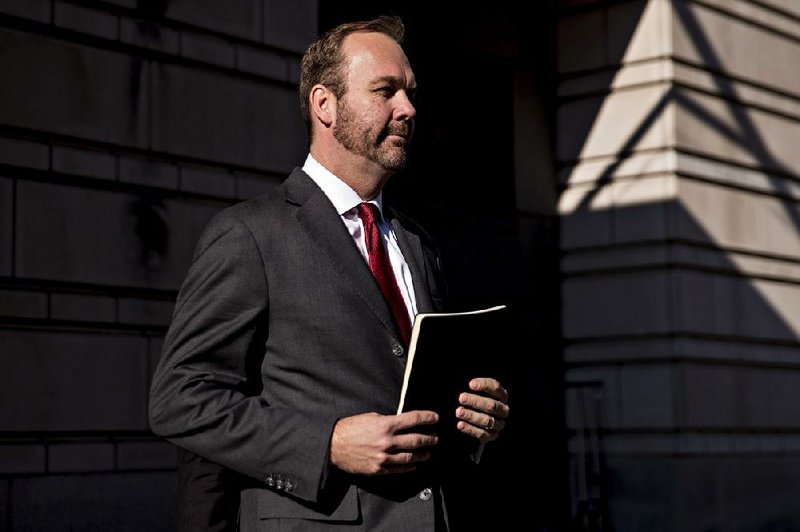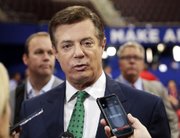WASHINGTON -- Lawyers for Rick Gates, the co-defendant of President Donald Trump's former campaign manager Paul Manafort, cited unspecified "irreconcilable differences" with their client in asking to leave the case, but a federal judge did not immediately rule on their request after a sealed hearing Wednesday.
U.S. District Judge Amy Berman Jackson of Washington took the matter under advisement after a nearly 90-minute hearing, held in private to preserve the secrecy of attorney-client communications.
Gates' attorneys Shanlon Wu of Washington and Walter Mack and Annemarie McAvoy of New York moved last week to withdraw as counsel in a shake-up in the pending prosecution by special counsel Robert Mueller, who is investigating Russian meddling in the 2016 presidential election.
A shift could leave Gates, 45, with his third set of defense lawyers since he and his former employer, Manafort, 68, were indicted Oct. 30 on fraud, conspiracy and money-laundering counts in the first disclosed charges in Mueller's probe.
[PRESIDENT TRUMP: Timeline, appointments, executive orders + guide to actions in first year]
Separately, 384 pages of text messages between two FBI officials were provided by the Justice Department to Congress and reviewed by The Associated Press. The texts, part of an inspector general investigation into the handling of the Hillary Clinton email probe, most notably include derogatory messages about Trump and resulted in FBI agent Peter Strzok's reassignment from Mueller's team. But they also include unguarded discussion about a variety of current events and public figures.
Trump responded to the latest disclosure of texts by tweeting Wednesday that the messages were "bombshells," though it wasn't exactly clear what he was referring to.
In the Gates filings unsealed Wednesday, the attorneys explained they wanted to discuss the reason for their request in secret because it involves private, "highly sensitive matters" concerning Gates that "would potentially be prejudicial to the Defendant as well as embarrassing."
They added, in a separate document, that "irreconcilable differences have developed with the client which make our effective representation of the client impossible," but they invoked the protections given to lawyers' discussions with their clients in asking to disclose the matter in closed court.
Gates and his lawyers have not shown public signs of discord, despite drawn-out bail talks and the appearance that he has fewer financial assets than initially asserted by prosecutors.
The lawyers' request to pull out of the case comes as the prosecution enters a new phase preparing for trial.
Both Gates and Manafort have pleaded innocent to the charges, which arose out of Manafort's alleged secret lobbying for a Russia-aligned political party in Ukraine.
After the indictment, Gates replaced his initial attorney, Michael Dry, with Mack, of Doar Rieck Kaley & Mack in New York; Wu, of Wu, Grohovsky & Whipple in Washington; and McAvoy, a former federal prosecutor and consultant specializing in financial-crime investigations.
CNN reported Jan. 23 that Gates had added prominent white-collar lawyer Thomas Green of Sidley Austin in Washington to his defense team after Green was spotted at Mueller's office, fueling speculation about ongoing negotiations with prosecutors.
Wu declined to comment after the hearing, citing a court gag order in place in the case. Green did not respond to requests for comment and was not in the courtroom Wednesday.
Gates, after more than two months under house arrest, finally reached bail terms in January on a nearly $5 million secured bond to gain conditional release. Defense attorneys also are sorting through more than 640,000 pieces of evidence turned over by prosecutors.
The judge has set deadlines starting April 6 for motions challenging the indictment before scheduling a possible fall trial date.
Manafort has yet to reach a bond deal and has individually filed a lawsuit challenging his indictment and Mueller's appointment as special counsel.
FBI TEXT MESSAGES
Among the thousands of text messages between Strzok and FBI lawyer Lisa Page, their dialogue pertaining to former FBI Director James Comey further calls into question White House characterizations of an FBI in "tatters," where "countless" agents complained about Comey before his May 9 removal -- one of the events now under investigation by Mueller for possible obstruction of justice.
Employee surveys released last year show FBI employees consistently gave Comey high marks. And emails published this week by the Lawfare blog show FBI field office leaders using words such as "profound sadness" and "hard to understand" in spreading the news about Comey's termination.
In July 2016, when Comey defended to Congress the bureau's decision not to seek charges against Clinton for her use of a private email server, Strzok and Page traded admiring texts about his verbal dexterity.
"God he is SO good," Strzok said of Comey, facing hours of questions about the decision. "I know," Page responded. "Brilliant public speaker. And brilliant distillation of fact."
The texts proved an explosive development when revealed in December, giving rise to Republican allegations of bias in the FBI and the Justice Department and leading Trump to make an extraordinary allegation of "treason" against Strzok that the agent's lawyer dismissed as "beyond reckless."
Strzok was removed from Mueller's group last summer after Mueller learned of the texts. Page, who had also been detailed to that team, left that assignment before the messages were discovered.
Since then, amid attacks on the bureau, Director Christopher Wray has defended the FBI as home to "tens and thousands of brave men and women." Attorney General Jeff Sessions, meanwhile, has been more muted in his support, saying some criticism may be appropriate and that political bias "in either direction" must be eliminated.
There's no question both Strzok and Page were stridently opposed to Trump's candidacy and the prospect of a Trump administration, using words like "idiot," "loathsome," "menace" and "disaster" to describe him. In one text four days before the election, Page told Strzok that the "American presidential election, and thus, the state of the world, actually hangs in the balance."
They frequently texted each other news stories about Russian election meddling, denigrated Trump associate Roger Stone and, in one profanity-laced message, Strzok cursed out the "cheating [expletive] Russians."
But the texts, which encompass a roughly two-year period beginning around the start of the Clinton email investigation in 2015, cover far more ground than Trump.
They underscore how the Clinton inquiry, well before the launch of the investigation into the Trump campaign and Russia, caused anxiety and tension within the FBI and Justice Department as witness interviews, strategic decisions and even public statements were picked apart internally and in the news media in the months preceding the election.
Strzok was distressed, for instance, that former President Bill Clinton had an impromptu meeting with Attorney General Loretta Lynch aboard her plane in the investigation's final stages. Lynch subsequently announced that she would accept the FBI's recommendations, setting the stage for Comey's announcement that the FBI would not seek charges.
"All the airport tarmac articles finally burst out. Took a little bit. Not a big deal, just ASTOUNDINGLY bad optic. And doesn't help what the D is trying to do," he texted in an apparent reference to the FBI director.
Weeks before that, Strzok confided to Page that Justice Department lawyers were concerned by the late discovery of classified marking notations along some paragraphs in State Department emails.
"No one noticed. And while minor, it cuts against, 'I never send or received anything marked classified," he wrote. "Because they're worried, holy cow, if the FBI missed this, what else was missed?"
He was also flummoxed earlier in the investigation by what he said was the "worst news" -- that a computer specialist had used wiping software to delete email messages, making it, he said, potentially "much harder" to recover what they needed.
The texts make clear that FBI leadership knew weeks before Comey alerted Congress that a trove of emails relevant to the Hillary Clinton investigation had been found on a laptop belonging to former Rep. Anthony Weiner, D-N.Y. It remains unclear why the FBI waited a month before revealing the discovery of new emails and before obtaining a warrant to scour them.
On Sept. 28, 2016, a month before the news became public, Strzok told Page that he'd been summoned to the deputy director's office because "hundreds of thousands of emails" had been turned over by Weiner's attorney to prosecutors as part of a sexting investigation, with a "ton of material" believed to be from Weiner's wife.
"This," Strzok wrote, "will never end."
Information for this article was contributed by Spencer S. Hsu of The Washington Post and by Eric Tucker of The Associated Press.
A Section on 02/08/2018

